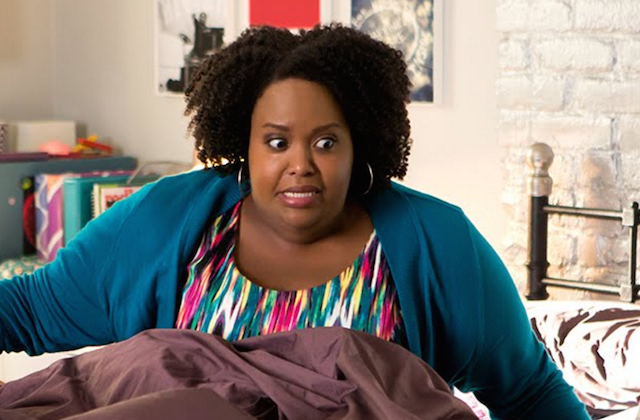From Conan O’Brien to Hannibal Buress, legions of former "Saturday Night Live" writers have gone on to fame in their own right. Natasha Rothwell, who wrote for the show last season—its historic 40th—appears well on her way to that kind of success, a success that, to be sure, remains elusive for female staff members of color until recently.
Working primarily in improv and sketch comedy, Rothwell moved to New York City from the Washington, D.C. area a few years ago and started performing at two theaters well-known as fertile breeding grounds for future comedy stars: Upright Citizens Brigade and The Peoples Improv Theater (PIT). It was at the PIT where she auditioned for and received the NBCUniversal Diversity Scholarship, which helped elevate her then-growing platform.
Now, Rothwell’s writing for the upcoming HBO show "Insecure," co-created by "Awkward Black Girl‘s" Issa Rae and "The Nightly Show’s" Larry Wilmore. Not only that, but she’s finally in front of the camera as one of the eight comedians featured in the hilarious new screwball comedy series, "Netflix Presents: The Characters," which premiered March 11. For that show, each featured player got a whole half-hour episode to create with, as Netflix describes it, "no rules, no limits." In her own episode, Rothwell portrays multiple characters, including a fictionalized version of herself who is navigating insecurity, jury duty and Tyson Beckford’s advances. Seriously.
Below, Rothwell speaks about SNL’s diversity problems, her kinship with Taraji P. Henson and the type of writers’ room she’d like on her own show.
You wrote on "Saturday Night Live" for the 2014 season, wrapping up in spring of 2015. What was your favorite sketch for which you wrote?
So many! I think I’m most proud of writing Taraji P. Henson‘s monologue. It was a really cool experience because the monologue is just a different beast. It opens the show, and you really get to work one-on-one with the guest. She couldn’t have been more lovely and into the idea I had, which was this gospel number that celebrated her no longer struggling. [Laughs.] The song is called "I Made It," and she just got to really reminisce about the things she had to do in the past, about her sort of hustle. It really resonated with me because I was on my hustle.
What was your least favorite sketch you were involved in?
Oh wow. [Laughs.] I really don’t have a least favorite, and I’m not even saying that to save face. Even for sketches that didn’t go well, it was writing a sketch for "Saturday Night Live" so that was just a win. [Laughs.] It’s all a team effort, and things are pre-written and worked on by a table of brilliant people. There’s no kind of "low" contribution. It’s just the nature of the beast that it’s a live show, that I have from Tuesday to Saturday for something to get from my brain to the air, and that so many things will change along the way. Had I been there longer, I would have a whole laundry list of [least favorites]. But it was my first year and the gratitude for getting something on air trumped any feeling of failure.
You worked at SNL in the midst of some ongoing controversies around the show’s diversity and how characters of color were used. Being a Black woman in the writers’ room during that year, did you get a sense that there was anything changing or anything you had to address?
It definitely was an interesting time to be at the show, and my introduction was through auditioning to be on the show. Being in the room was eye-opening for how many factors come into play to bring a sketch to air. I think changes, like diversifying an institution, are things that take time. But I think SNL can be applauded for really making a conscious effort to know that their audiences are diverse and their cast should reflect that. I felt really privileged to be a voice that was different and able to speak up and contribute new ideas from a perspective that wasn’t represented.
Did you ever feel like you were put in positions in the writers’ room that you wouldn’t have been in elsewhere?
Being put in a room in a climate where that particular show was under fire, there was definitely a unique stress that I feel like I experienced. Conversely, I’m currently writing on a brand new show on HBO called "Insecure," and I think there’s one straight White male in the room. [Laughs.] More than anything, SNL really showed me how I want the room to look when I get my own show. It will reflect the world I live in, and how important that aspect of television is. The room is so often unseen, but it’s so crucial to make sure the voices of that particular show are diverse.
What’s your favorite part about "The Characters?"
Well, opportunities like this don’t come around often, if at all. I was so excited to have a platform where I could showcase my comic sensibilities, range, voice and style. I was thrilled to have the opportunity to explore a world in which I could see disparate people connected through certain experiences and chance encounters, because that really speaks to me creatively. It was something really powerful to be trusted with a half-hour and be told to really run with it. At SNL, there were so many checks, balances, rewrites and things that we were told to change, it was hard to find the sliver on the Venn diagram of what I thought was funny and what was funny to the show. With Netflix, it was just like, "What do you think is funny?" To not to have that questioned but celebrated was just dope. [Laughs.]
Catch Natasha Rothwell on "Netflix Presents: The Characters," available for streaming now.
